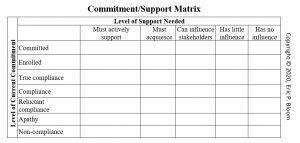There are many traditional negotiation strategies that can be used to gain an upper hand during negotiations. They include:
- Threatening to walk away from the deal
- Pushing the other party to make a quick decision
- Intimidation (yuck, don’t use this one)
- Nibbling (asking for a little extra value in anticipation of closing the deal)
- Crying poor (saying you only have a certain amount of money to spend)
- Beginning negotiations with a second party (considering a competing bid for the business)
- Dividing a large vendor proposal into small pieces and then negotiating each smaller task’s price
In addition to these time-tested negotiation techniques, the use of influence-based strategies can also enhance your negotiation success. These influence-based strategies include:
Influencer #1: Problem/Vision Statements
Clearly define the business problem the negotiation is addressing and a future vision (your future vision) of how to solve the problem. If you can get the other party to agree with your vision, then your negotiating position will be greatly improved because all future discussions will be based on your vision.
The Problem/Vision statements you create could use the following templates:
Problem Definition
- The problem is _____, resulting in ______, thereby having the consequence of ______.
Problem End State (Vision)
- It would be great if ____, allowing us to _____, thereby having the advantage of _____.
Influencer #2: Taking logistical control
Logistical control is about managing negotiation-related activities, such as emailing the meeting invitations and reserving the conference room. Taking this control puts you in a pseudo-leadership role over the other negotiators.
When you take logistical control of the negotiation by scheduling the meetings, selecting the location, ordering snacks, and paying for lunch, you set a precedent. Once this precedent is set, roles are defined, and it positions you to drive the pace, location, agenda, and other related items of the negotiations to your advantage.
This also has a second advantage of creating agreement momentum in your favor. For example, try to get the other party to say (in this order):
- Yes, we can meet in your office.
- Yes, next Tuesday at 1 p.m. is fine.
- Yes, thank you for bringing in lunch. I’ll have a chicken sandwich please.
- Yes, I would like a cup of coffee. Thank you.
- Yes, I’ll agree to your contract terms.
As an added benefit, if they appreciate your efforts in planning the meeting and bringing lunch, then you are also creating a sense of reciprocity.
Influencer #3: You should write the contract
Given the opportunity, you (your team) should write the contract. You must be fair, but when you write the contract, the negotiation begins with everything you want on the table. Like selecting the meeting’s location, this technique also enhances your ability to take logistical control of the negotiation process.
Tactics of this type include:
- Start by using your company’s Non-Disclosure Agreement (NDA). (They are all basically the same anyway.)
- Speak with your internal legal group to make sure they are willing to write it.
- Offer to write the contract.
- Have the other side suggest changes, and then incorporate them into the contract.
Influencer #4: Accepting constructive feedback
If the other person gives you feedback on your proposal, suggestions, or anything else, use this to your advantage through leading by example. Appreciate the feedback and show your willingness to consider it. This positions you to give feedback, when the time is right; that subtlety moves the other person toward your position. Because you previously accepted their feedback, they will now be more likely to accept yours.
One caution: If you accept their advice too often without them accepting yours, this could create a precedent and cultural norm that is hard to overcome. In fact, you are trying to create the reverse.
Potential tactics if the other person gives you feedback or suggestions include:
- Truly appreciate the feedback.
- Show your willingness to consider their ideas.
- Act on their feedback only if you think it’s to your current or future advantage.
Influencer #5: Taking the moral high ground
If you can find a way to align your negotiation interests with a greater good, for example being good for the company, then it becomes more difficult for the other person to push their personal agenda because it comes across as less worthy and less moral.
Potential tactics include tying your negotiating position to:
- Organizational objectives
- Company values (environmental protection, local outreach, etc.)
- Company wellbeing (increased profit)
- Social cause important to the other party
Influencer #6: Show gratitude
Gratitude is one of the Cohen-Bradford currencies. If you are negotiating with someone who likes to be acknowledged for having done something nice, thanking them is not only the right thing to do, but it is also to your influential-benefit. If you feed their personal need to be thanked, they will not only like you more, but they will also be more likely to give you additional favors.
Tactics of this type include:
- Say “Thank you” or “Thanks. I appreciate it” when deserved.
- Thank the person in public or by copying their manager on an email.
- Describe their good deed in a meeting as an example for others.
Influencer #7: Be a problem solver
As problems arise during the negotiation, proactively be the one to solve them. By doing so, you create a precedent and micro-culture that features you as the group’s problem solver. This will have a great influential-advantage when negotiation-based issues arise because people will look to you to solve issues, thus allowing you to solve issues to your advantage.
Potential tactics as small problems that may arise include:
- Finding flipchart paper during a meeting
- Inviting a subject matter expert to help on a specific topic
- Having an extra pen in case someone forgot theirs
Influencer #8: Presentation excellence
Never underestimate the power of making a good presentation or clearly articulating an important message. People will be impressed by your ability to present your thoughts and, as a result, will be more likely to be swayed by you.
If you don’t consider yourself a good public speaker, look into workshops or Toastmasters International or some other training. Public speaking is one of the most important things you can do to enhance your career.
Influencer #9: Be calm during adversity
When discussions get heated, people naturally turn to the person who can show calming strength and conviction. If this person is you, when the negotiation becomes tense, you can be the voice of reason, civility, and professional decorum. When people turn to you, you can influence the players’ actions and the direction of the discussion, which, of course, is toward your interests.
Influencer #10: Storytelling
Carefully crafted stories that include facts, emotion, and vision can influence others to follow your negotiation positions. The story has to resonate with them personally by touching their values, business needs, professional aspirations, sense of fairness, empathy, ethics, or other related business/personal connections.
Tactics of this type include:
- Gaining an understanding of the other party’s values, negotiation needs, and wants
- Defining a story that forwards your negotiation goals
- Crafting the story in a way that resonates with their:
- Business needs
- Personal values
- Professional aspirations
- Sense of fairness, empathy, and ethics
- Practice, practice, practice





